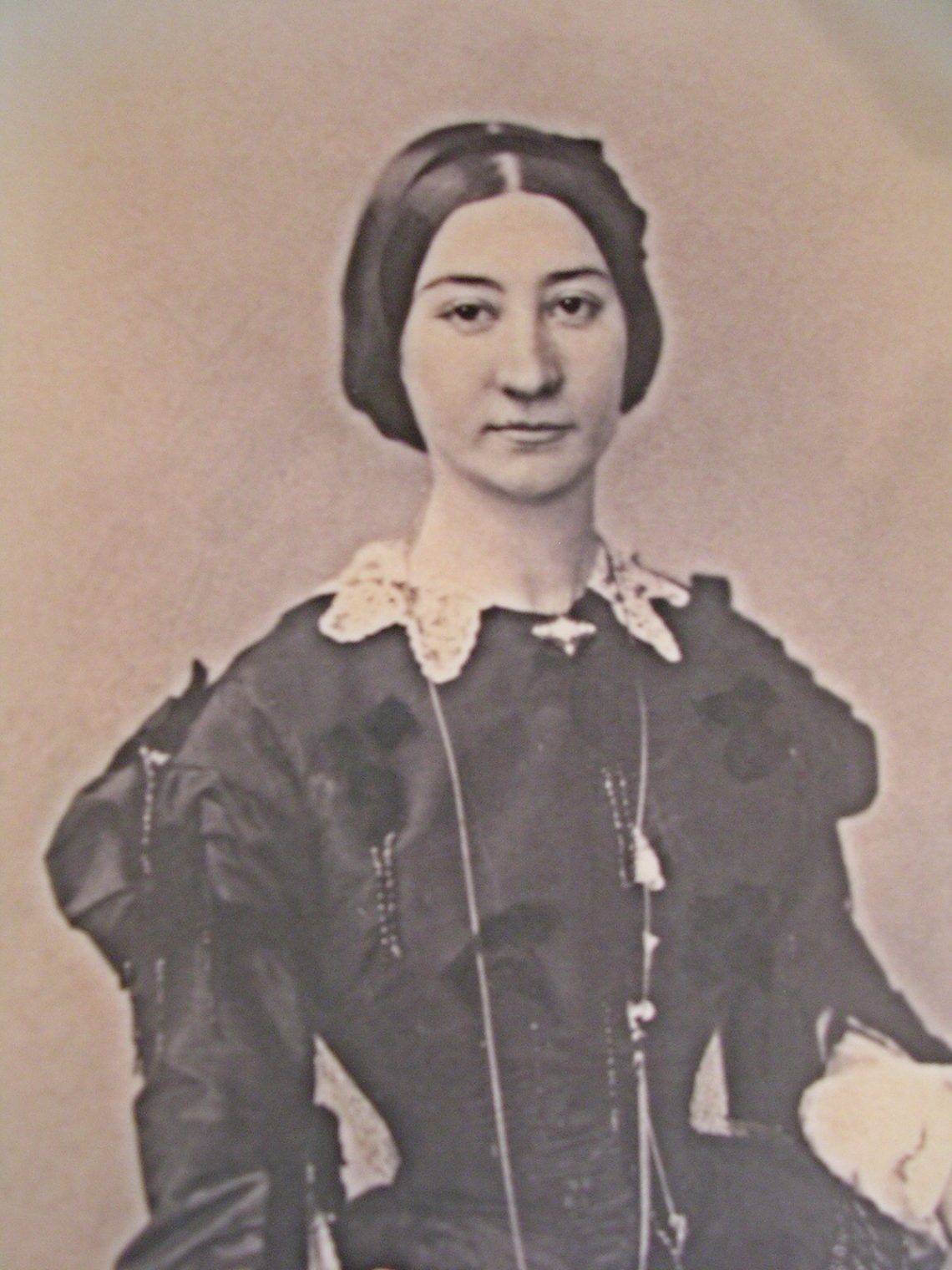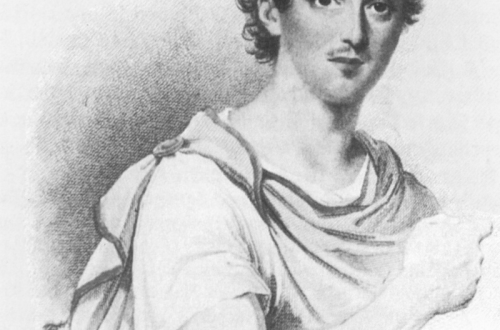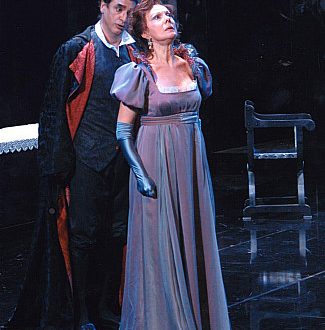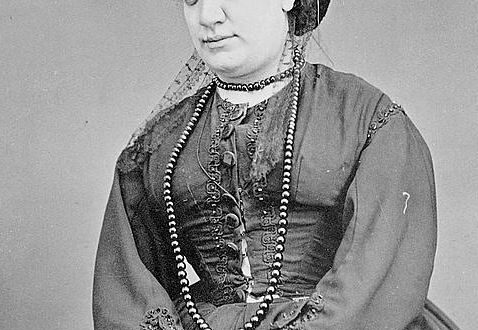
Angiolina Bosio (Angiolina Bosio) |
Angiolina Bosio
Angiolina Bosio did not even live thirty years in the world. Her artistic career lasted only thirteen years. One had to have a bright talent to leave an indelible mark on the memory of people in that era, so generous with vocal talents! Among the admirers of the Italian singer are Serov, Tchaikovsky, Odoevsky, Nekrasov, Chernyshevsky …
Angiolina Bosio was born on August 28, 1830 in the Italian city of Turin, in the family of an actor. Already at the age of ten, she began to study singing in Milan, with Venceslao Cattaneo.
The debut of the singer took place in July 1846 at the Royal Theater in Milan, where she performed the role of Lucrezia in Verdi’s opera “The Two Foscari”.
Unlike many of her contemporaries, Bosio enjoyed even greater popularity abroad than at home. Repeated tours of Europe and performances in the United States brought her universal recognition, put her very quickly on a par with the best artists of that time.
Bosio sang in Verona, Madrid, Copenhagen, New York, Paris. Vocal fans warmly welcomed the artist on the stage of London’s Covent Garden Theatre. The main thing in her art is sincere musicality, nobility of phrasing, subtlety of timbre colors, inner temperament. Probably, these features, and not the strength of her voice, attracted the increased attention of Russian music lovers to her. It was in Russia, which became the second homeland for the singer, that Bosio won special love from the audience.
Bosio first came to St. Petersburg in 1853, already at the zenith of her fame. Having made her debut in St. Petersburg in 1855, she sang for four seasons in a row on the stage of the Italian Opera and with each new performance won an increasing number of fans. The singer’s repertoire is exceptionally wide, but the works of Rossini and Verdi occupied a central place in it. She is the first Violetta on the Russian stage, she sang the roles of Gilda, Leonora, Louise Miller in Verdi’s operas, Semiramide in the opera of the same name, the Countess in the opera “Count Ori” and Rosina in Rossini’s “The Barber of Seville”, Zerlina in “Don Giovanni” and Zerlina in ” Fra Diavolo, Elvira in The Puritans, the Countess in The Count Ory, Lady Henrietta in March.
In terms of the level of vocal art, the depth of penetration into the spiritual world of the image, the high musicality of Bosio belonged to the greatest singers of the era. Her creative individuality was not revealed immediately. Initially, listeners admired the amazing technique and voice – a lyrical soprano. Then they were able to appreciate the most precious property of her talent – inspired poetic lyricism, which manifested itself in her best creation – Violetta in La Traviata. The debut as Gilda in Verdi’s Rigoletto was greeted with approval, but without much enthusiasm. Among the first responses in the press, the opinion of Rostislav (F. Tolstoy) in The Northern Bee is characteristic: “Bosio’s voice is a pure soprano, unusually pleasant, especially in medium sounds … the upper register is clear, true, although not too strong, but gifted with some sonority, not devoid of expressiveness. However, the columnist Raevsky soon states: “Bozio’s first debut was successful, but she became the favorite of the public after her performance of the part of Leonora in Il trovatore, which was first presented to the St. Petersburg public.”
Rostislav also noted: “She did not want to surprise or, rather, amaze the audience from the first time with difficult vocalization, unusually spectacular or pretentious passages. On the contrary, for … her debut, she chose the modest role of Gilda (“Rigoletto”), in which her vocalization, in the highest degree remarkable, could not come out completely. Observing gradualness, Bosio appeared alternately in The Puritans, Don Pasquale, Il trovatore, The Barber of Seville and The North Star. From this deliberate gradualness there was a wonderful crescendo in Bosio’s success … Sympathy for her grew and developed … with each new game, her treasures of talent seemed inexhaustible … After the graceful part of Norina … public opinion awarded our new prima donna a crown of mezzo-characteristic parts … But Bosio appeared in “Troubadour”, and amateurs were perplexed, listening to her natural, expressive recitation. “How is it …,” they said, “we believed that deep drama was inaccessible to our graceful prima donna.”
It is difficult to find words to describe what happened on October 20, 1856, when Angiolina performed the part of Violetta for the first time in La Traviata. General madness quickly turned into popular love. The role of Violetta was the highest achievement of Bosio. The rave reviews were endless. Especially noted was the amazing dramatic skill and penetration with which the singer spent the final scene.
“Have you heard Bosio in La Traviata? If not, then by all means go and listen, and for the first time, as soon as this opera is given, because, no matter how briefly you know the talent of this singer, without La Traviata your acquaintance will be superficial. Bosio’s rich means as a singer and dramatic artist are not expressed in any opera in such brilliance. Here, the sympathy of the voice, the sincerity and grace of the singing, the elegant and intelligent acting, in a word, everything that makes up the charm of the performance, through which Bosio has captured the unbounded and almost undivided favor of the St. Petersburg public – everything has found excellent use in the new opera. “Only Bosio in La Traviata is now being talked about … What a voice, what a singing. We don’t know anything better in St. Petersburg at the present time.”
It is interesting that it was Bosio who inspired Turgenev for a wonderful episode in the novel “On the Eve”, where Insarov and Elena are present in Venice at the performance of “La Traviata”: “The duet began, the best number of the opera, in which the composer managed to express all the regrets of the insanely wasted youth, the last struggle desperate and powerless love. Carried away, carried away by a breath of general sympathy, with tears of artistic joy and real suffering in her eyes, the singer gave herself up to the rising wave, her face changed, and in front of the formidable ghost … of death, with such a rush of prayer reaching the sky, the words came out of her: “Lasciami vivere … morire si giovane!” (“Let me live… die so young!”), that the whole theater crackled with frenzied applause and enthusiastic cries.”
The best stage images – Gilda, Violetta, Leonora and even cheerful heroines: images – … heroines – Bosio gave a touch of thoughtfulness, poetic melancholy. “There is a kind of melancholy tone in this singing. This is a series of sounds that pour right into your soul, and we completely agree with one of the music lovers who said that when you listen to Bosio, some kind of mournful feeling involuntarily aches your heart. Indeed, such was Bosio as Gilda. What, for example, could be more airy and elegant, more imbued with the poetic coloring of that trill with which Bosio ended her aria of Act II and which, starting forte, gradually weakens and finally freezes in the air. And every number, every phrase of Bosio was captured by the same two qualities – the depth of feeling and grace, the qualities that make up the main element of her performance … Graceful simplicity and sincerity – that’s what she mainly strives for. Admiring the virtuoso performance of the most difficult vocal parts, critics pointed out that “in Bosio’s personality, the element of feeling prevails. Feeling is the main charm of her singing – charm, reaching charm … The audience listens to this airy, unearthly singing and is afraid to utter one note.
Bosio created a whole gallery of images of young girls and women, unhappy and happy, suffering and rejoicing, dying, having fun, loving and loved. A.A. Gozenpud notes: “The central theme of Bosio’s work can be identified by the title of Schumann’s vocal cycle, Love and Life of a Woman. She conveyed with equal force the fear of a young girl before an unknown feeling and the intoxication of passion, the suffering of a tormented heart and the triumph of love. As already mentioned, this theme was most profoundly embodied in the part of Violetta. Bosio’s performance was so perfect that even such artists as Patti could not oust him from the memory of his contemporaries. Odoevsky and Tchaikovsky highly valued Bosio. If the aristocratic spectator was captivated in her art by grace, brilliance, virtuosity, technical perfection, then the raznochinny spectator was captivated by penetration, trepidation, warmth of feeling and sincerity of performance. Bosio enjoyed great popularity and love in a democratic environment; she often and willingly performed in concerts, the collection from which was received in favor of the “insufficient” students.
Reviewers unanimously wrote that with each performance, Bosio’s singing becomes more perfect. “The voice of our charming, pretty singer has become, it seems, stronger, fresher”; or: “… Bosio’s voice gained more and more strength, as her success strengthened … her voice became louder.”
But in the early spring of 1859, she caught a cold during one of her tours. On April 9, the singer died of pneumonia. The tragic fate of Bosio appeared again and again before the creative gaze of Osip Mandelstam:
“A few minutes before the start of the agony, a fire wagon rumbled along the Nevsky. Everyone recoiled towards the square misted windows, and Angiolina Bosio, a native of Piedmont, the daughter of a poor itinerant comedian – basso comico – was left for a moment to herself.
… The militant graces of cock fire horns, like an unheard-of brio of unconditional victorious misfortune, burst into the poorly ventilated bedroom of Demidov’s house. Bitiugs with barrels, rulers and ladders rumbled, and the frying pan of torches licked the mirrors. But in the dimmed consciousness of the dying singer, this heap of feverish bureaucratic noise, this frantic gallop in sheepskin coats and helmets, this armful of sounds arrested and taken away under escort turned into the call of an orchestral overture. The last bars of the overture to Due Poscari, her debut London opera, sounded distinctly in her small, ugly ears…
She rose to her feet and sang what she needed, not in that sweet, metallic, supple voice that had made her famous and praised in the papers, but with the chesty raw timbre of a fifteen-year-old teenage girl, with the wrong, wasteful delivery of the sound for which Professor Cattaneo scolded her so much.
“Farewell, my Traviata, Rosina, Zerlina…”
The death of Bosio echoed with pain in the hearts of thousands of people who passionately loved the singer. “Today I learned about the death of Bosio and regretted it very much,” Turgenev wrote in a letter to Goncharov. – I saw her on the day of her last performance: she played “La Traviata”; she did not think then, playing a dying woman, that she would soon have to play this role in earnest. Dust and decay and lies are all earthly things.
In the memoirs of the revolutionary P. Kropotkin, we find the following lines: “When the prima donna Bosio fell ill, thousands of people, especially young people, stood idle until late at night at the door of the hotel to find out about the health of the diva. She was not pretty, but she seemed so beautiful when she sang that the young people who were madly in love with her could be counted in the hundreds. When Bosio died, she was given a funeral such as Petersburg had never seen before.
The fate of the Italian singer was also imprinted in the lines of Nekrasov’s satire “On the Weather”:
Samoyed nerves and bones They will endure any cold, but you, Vociferous southern guests, Are we good in winter? Remember – Bosio, The proud Petropolis spared nothing for her. But in vain you wrapped yourself in sable Nightingale’s throat. Daughter of Italy! With Russian frost It’s hard to get along with midday roses. Before the power of his fatal You drooped your perfect forehead, And you lie in a foreign land In a graveyard empty and sad. Forgotten you alien people On the same day that you were handed over to the earth, And for a long time there another sings, Where they showered you with flowers. There’s light, there’s a double bass buzzing, There are still loud timpani. Yes! in the sad north with us Money is hard and laurels are expensive!
On April 12, 1859, Bosio seemed to bury all of St. Petersburg. “A crowd gathered for the removal of her body from Demidov’s house to the Catholic Church, including many students who were grateful to the deceased for arranging concerts for the benefit of insufficient university students,” a contemporary of the events testifies. Chief of Police Shuvalov, fearing riots, cordoned off the church building with policemen, which caused general indignation. But the fears turned out to be unfounded. The procession in mournful silence went to the Catholic cemetery on the Vyborg side, near the Arsenal. On the grave of the singer, one of the admirers of her talent, Count Orlov, crawled on the ground in complete unconsciousness. At his expense, a beautiful monument was later erected.





